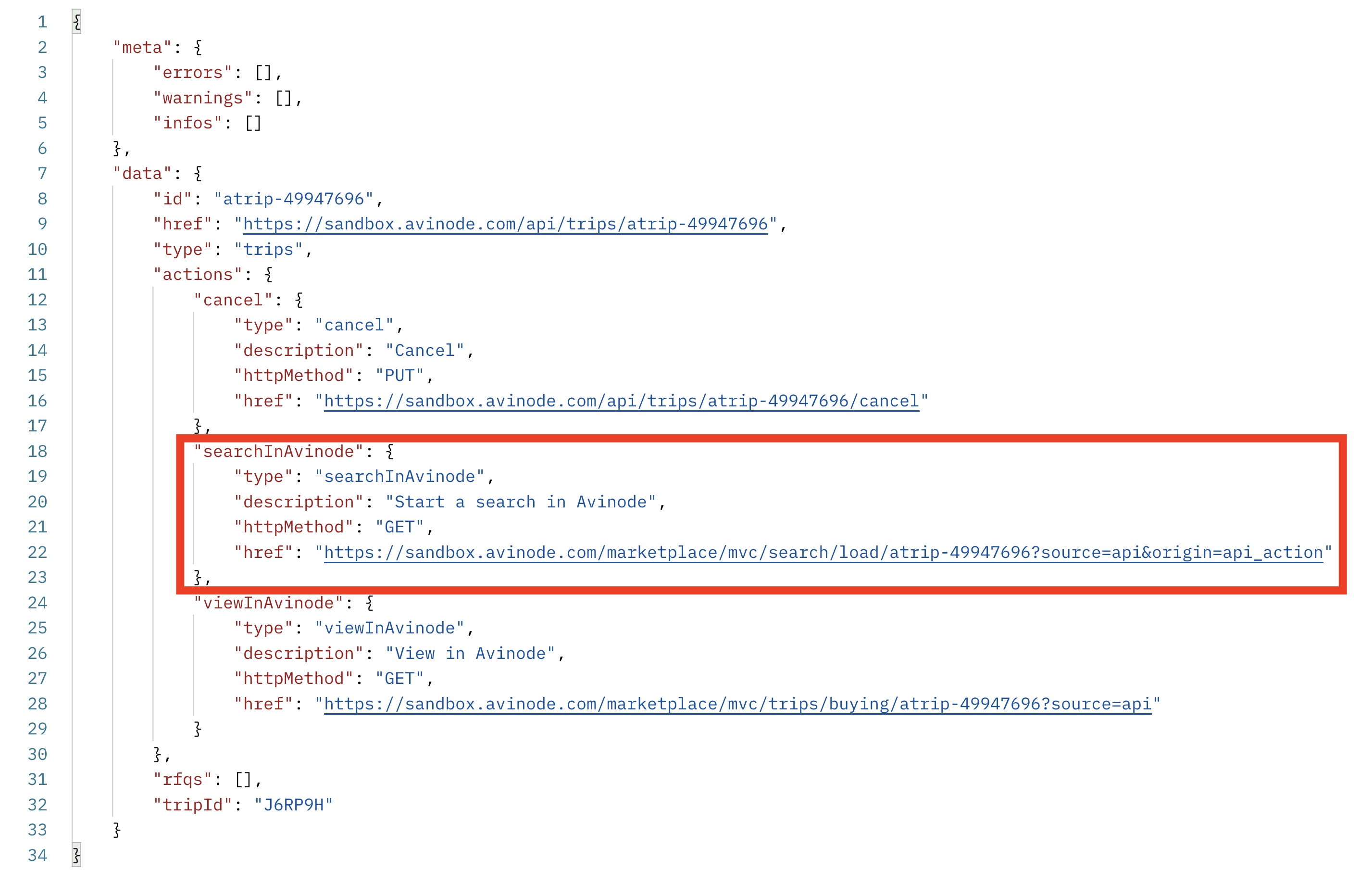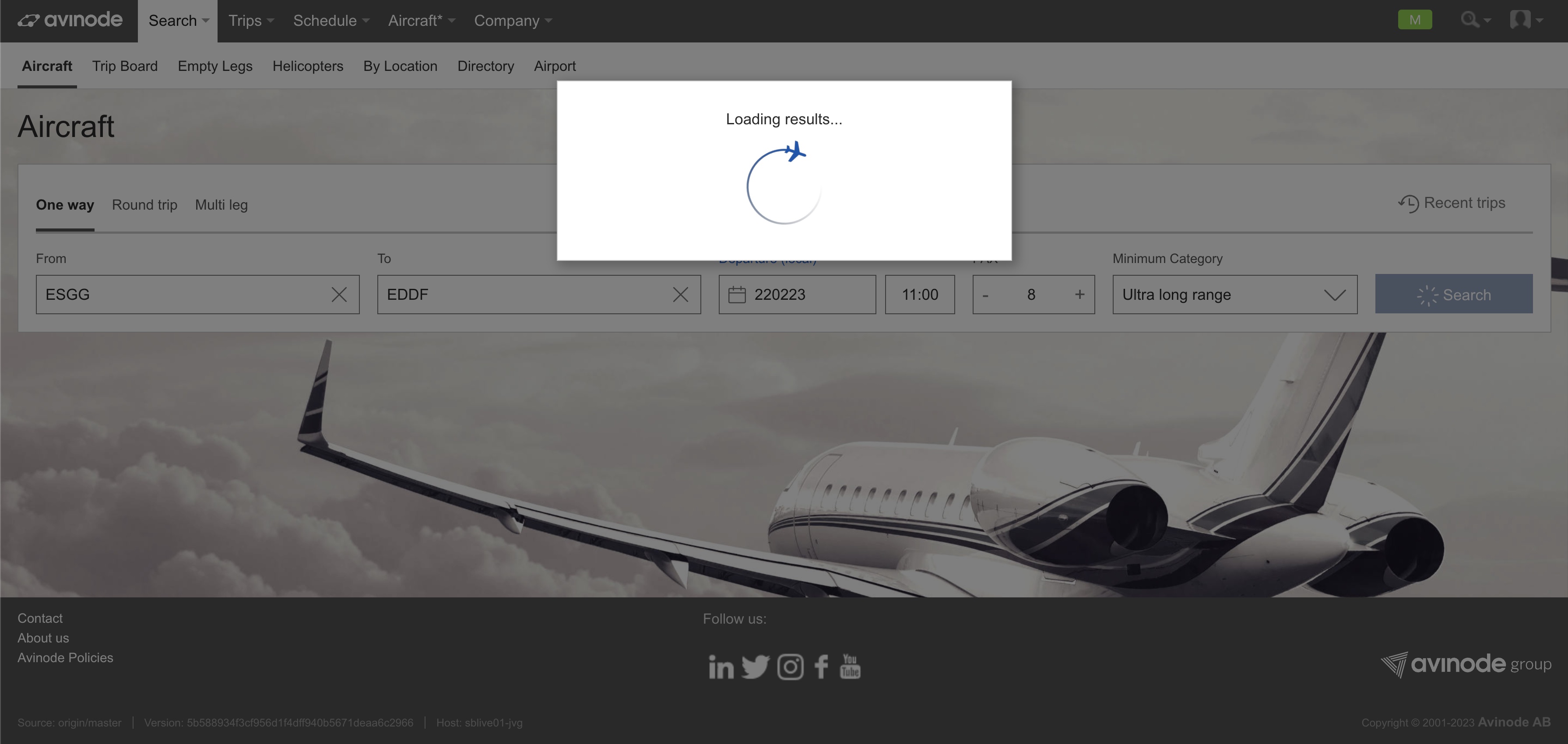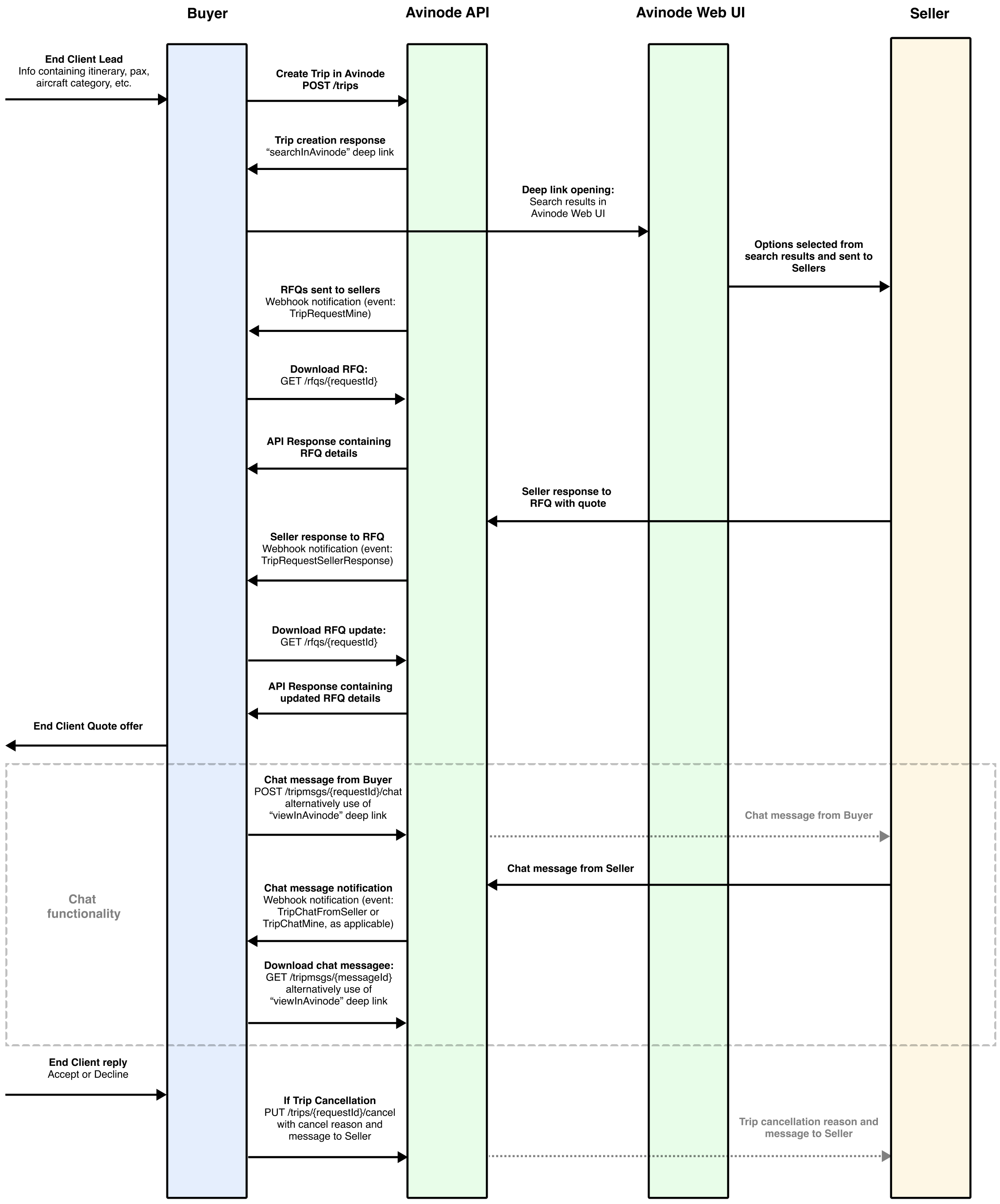Search in Avinode from Your System
By integrating your system with Avinode, you can streamline the process of finding and viewing available options for a trip. This eliminates the need to manually switch to the Avinode system and enter trip data.
Overview
By implementing this use case, you can quickly access and view available options for a trip without having to manually switch to the Avinode system and enter trip details. This feature enables seamless retrieval and display of available options for a specific trip through the Avinode API, saving valuable time and streamlining the buying process. Additionally, the integration allows for the downloading of leads, quotes, and launching a search in Avinode based on an inquiry from your end client.
Pre-requisites
Gaining an understanding of our APIs and fundamentals is essential to the success of your project. To do so, start by reading our introductions page, including the pages linked in the "Before you start" section. Also read about our webhooks.
Please note
When initiating a trip search this will need to be conducted within the Avinode Web UI via the deep-link explained below.
Implementation and API Examples
Initiate a Search in Avinode from Your System
The application should call the POST /trips operation with the needed trip information such as itinerary, number of passengers, aircraft category, date and time.
If the exact departure time is not known at the time this value can be marked as "TBD" (to be determined), see the API reference page for more details.
In the response from this API call there will be a deep link to use for opening a new browser window with the Avinode search, which will be initiated immediately.

The 'searchInAvinode' action / deep-link within the API response body

Search In Avinode deep-link pop-up in Avinode
Please note
Avinode does not allow any business to business integrations to use the POST /searches operation, this API is only used by integrations from business to end client.
Download RFQ for Requested trip
Once sourcing has been done within the Avinode Web UI, the application will be notified via webhook on where to fetch the appropriate RFQ via the GET /rfqs/{id} call. The RFQ(s) should be fetched by the calling application's back end upon webhook notification.
New Seller Messages Notification via Webhook
Setup webhook settings in Avinode to subscribe to all new seller messages for your trip requests, i.e. Trip Chat - Seller and Trip Request - Seller response. This will ensure that your system gets notified in real time when an operator accepts or declines your requests, or sends you a chat message.
Responding to New Seller Message
You have the option to choose between two workflows when implementing the feature to respond to a new seller message.
1. Respond from your own system
This will enable your system to download and respond to chat messages via the API. Your system will have to call on the following endpoints: Read a trip message and Send a message.
2. Respond from Avinode Web UI via chat deep-link
Responding to chat messages via a deep-link provided in the API response body is possible when reading a seller message or when downloading an RFQ.
This is acheived by calling on the "viewInAvinode" deep-link within the chat message response body (data.lift.actions.viewInAvinode) or the "viewInAvinode" deep-link within the RFQ response body (data.sellerLift.actions.viewInAvinode), your system user will be taken directly to the particular chat message within the Avinode Web UI via a new browser window.
See example below:
{
"data": {
"id": "asellermsg-70609223",
"href": "https://services.avinode.com/api/tripmsgs/asellermsg-70609223",
"type": "tripmsgs",
"links": {
...snip...
},
{
"lift": [
{
...snip...
},
"actions": {
"viewInAvinode": {
"type": "viewInAvinode",
"description": "View in Avinode",
"httpMethod": "GET",
"href": "https://marketplace.avinode.com/marketplace/mvc/trips/buying/atrip-50646110?source=api#eyJleHBlZE-N0t-w0rKiN6ybGlmdjU4NTYifQ=="
}
},
"aircraftCategory": "Super midsize jet",
"aircraftType": "Challenger 350",
"aircraftSuperType": "Challenger 350",
"suggestedByAvinode": false,
"sourcingDisplayStatus": "Unanswered",
"sourcingStatus": 1
}
],
...snip...
},
"tripId": "USUKHG"
}
}
Trip Cancellation
In the event that a trip needs to be canceled, this should be done by calling upon the PUT /trips/{id}/cancel. A cancellation reason along with a cancellation chat message should be supplied in the body payload. The reason for the cancellation should be one of the following: "BY_CLIENT", "CHANGED", "BOOKED", "OTHER".
{
"id": "atrip-1686310600",
"messageToSeller": "Sorry, the client has requested to cancel this trip.",
"reason": "BY_CLIENT"
}
Posting Trips to Avinode Trip Board
When creating a trip in Avinode you have the option to also simultaneously post it to the Trip Board. This is done by utilizing the POST /trips API endpoint and including the following parameters in your API call:
- postToTripBoard: Set this parameter to true in the POST /trips API call to ensure the created trip is posted to the Trip Board.
- tripBoardPostMessage: Optionally, include this parameter to add a custom message when posting the trip to the Trip Board.
Workflow diagram: Search in Avinode from Your System

Go Live!
Let's see if you are ready to go to production.
Implementation checklist
All items on this check list must be implemented in order for an application with this use case to be allowed to call the live Avinode Marketplace environment.
- The application must comply with the Basic Go Live requirements.
- The application has correct eventTypes webhook notification settings configured for the use case, i.e.
TripRequestSellerResponse, TripRequestMine, TripChatFromSeller, TripChatMine- The receiving webhook server responds with a HTTP 200 status upon accepting the webhook notification
- The application is calling the POST /trips endpoint with valid itinerary payload
- The application is utilising the searchInAvinode deeplink to run an automatic search in Avinode based on the trip payload
- Sourcing activity, i.e. RFQ is sent to operator/s from within the Avinode Web UI
- The application back-end successfully downloads the RFQ data, upon webhook notification
- The application has support for sending and receiving trip messages using appropriate chat endpoints, alternatively, responds from within the Avinode Web UI by utilising the "viewInAvinode" deep-link
- Updates (accept/decline/cancellation/chat messages) to the trip are sent to Avinode via appropriate API endpoints
- The applicaton has support for when a trip gets cancelled, the appropriate PUT /trips/{id}/cancel endpoint is called containing a cancellation message and a cancellation reason.
Updated about 1 month ago